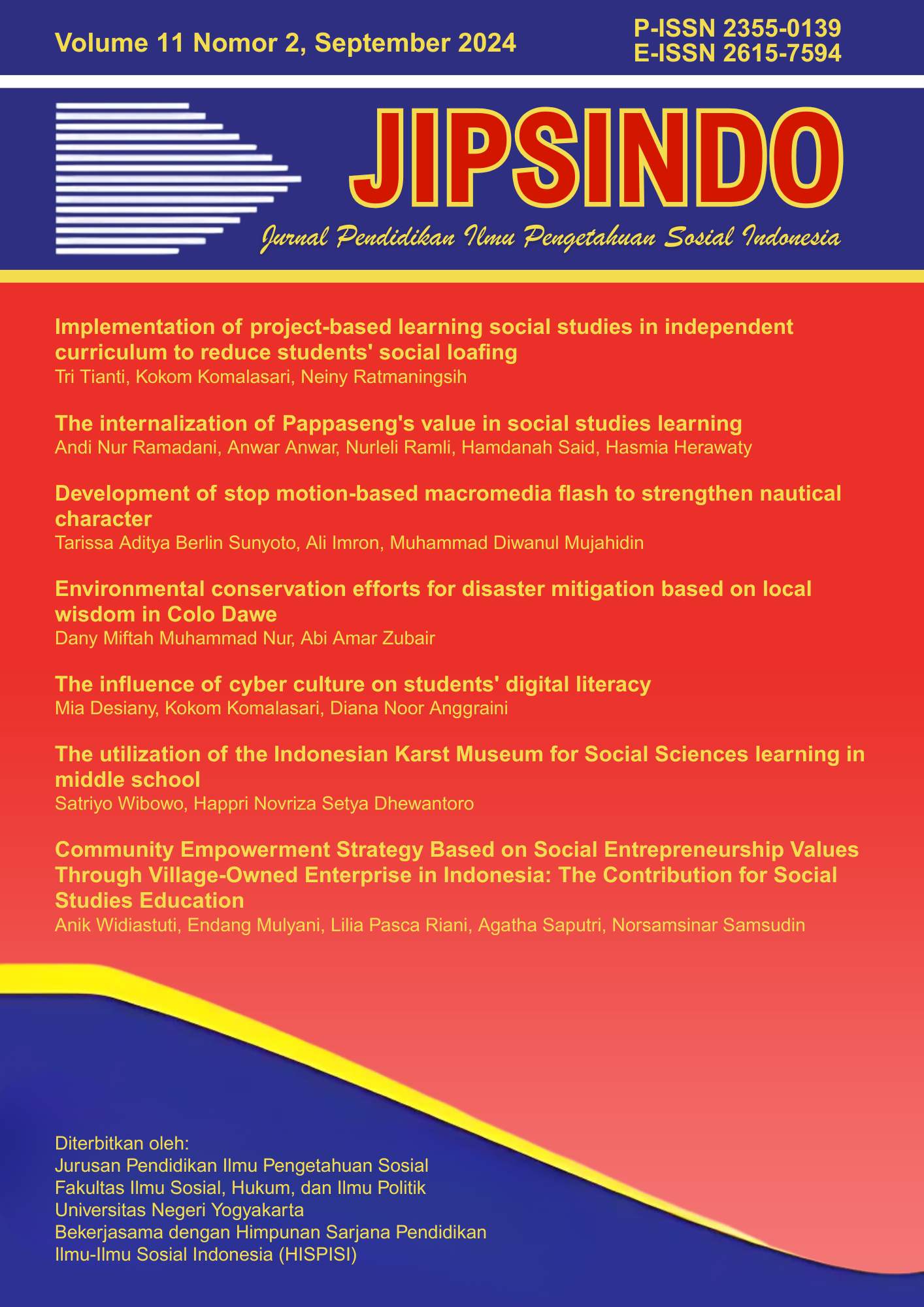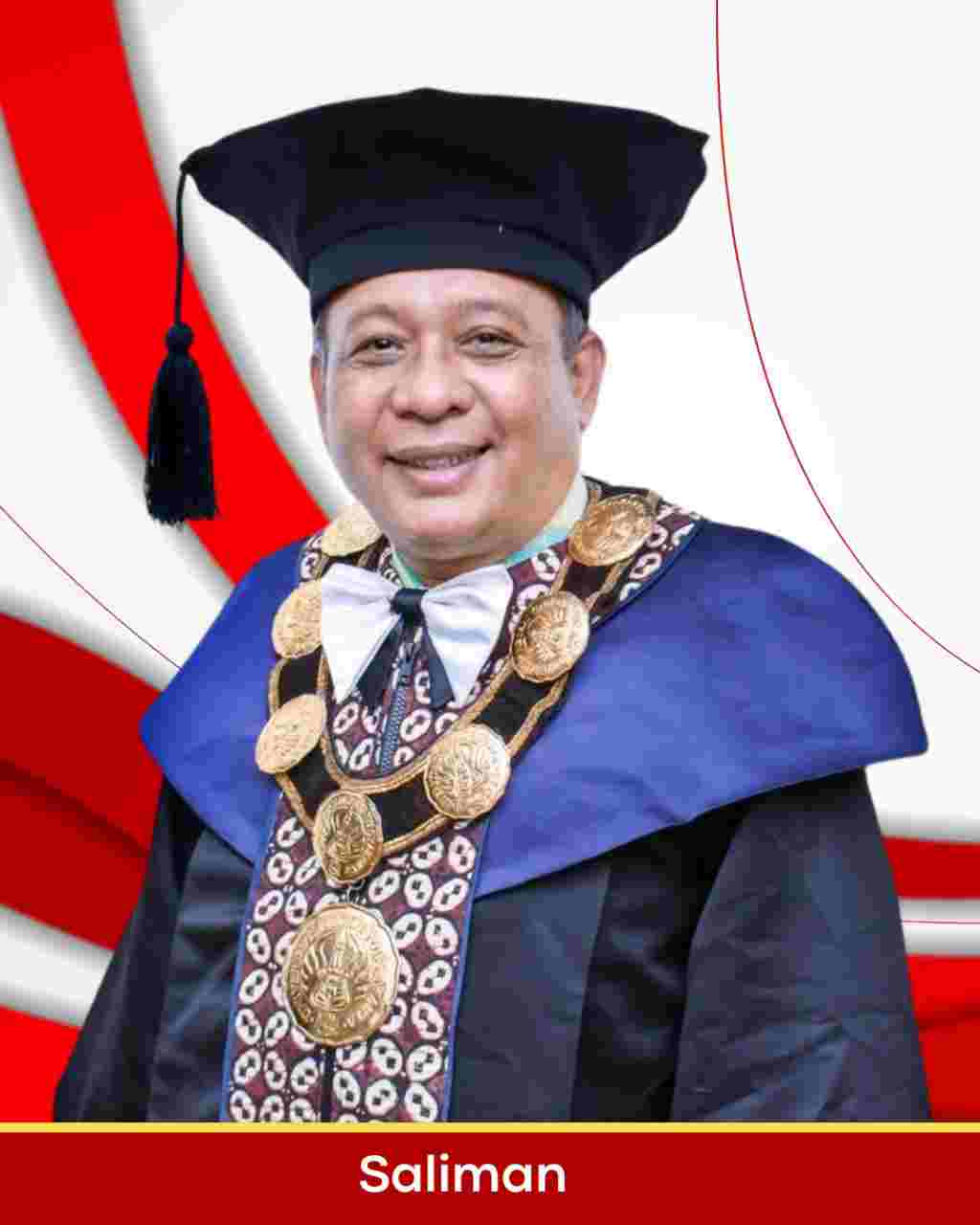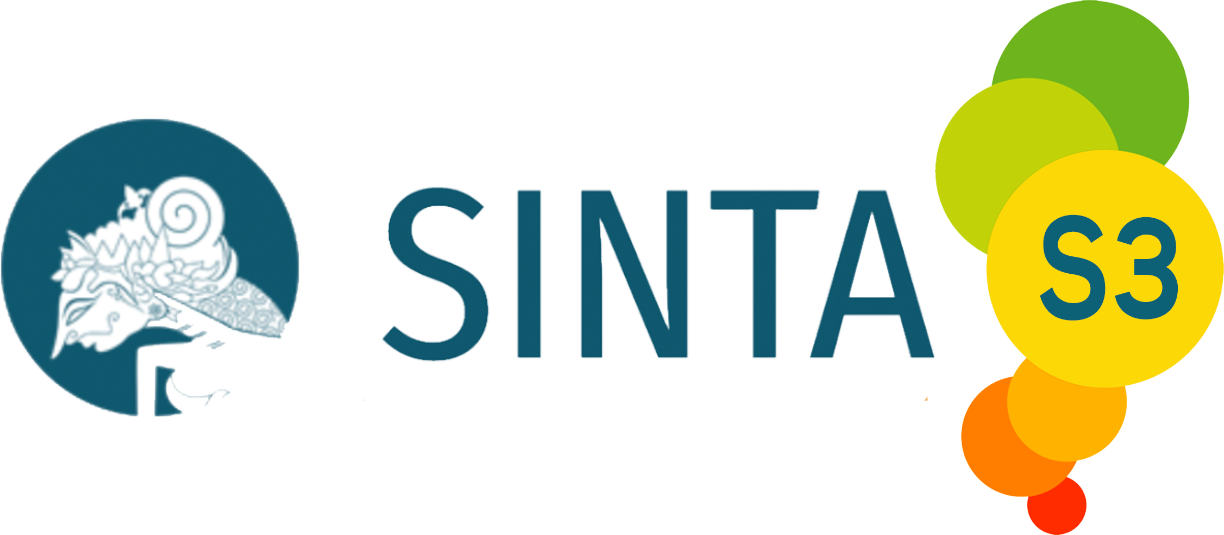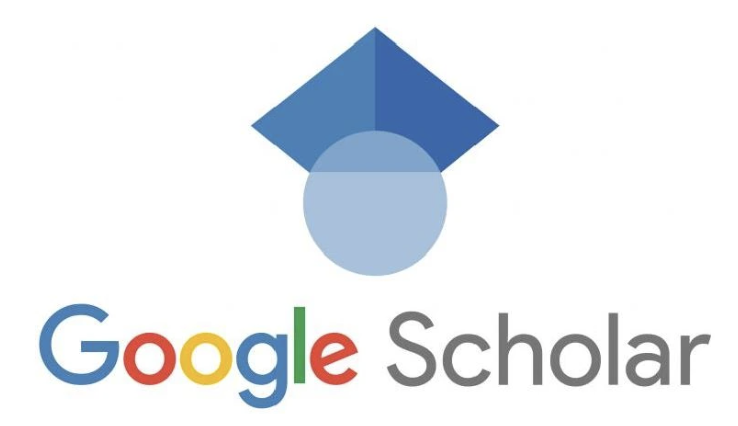The utilization of the Indonesian Karst Museum for Social Sciences learning in middle school
DOI:
https://doi.org/10.21831/jipsindo.v11i2.77785Abstract
This study seeks to explore how the Indonesian Karst Museum can be used in creating educational materials for Social Studies within the Gunung Sewu UNESCO Global Geopark area, while also exploring the museum's potential as an educational medium to enhance students' understanding of geology and karst ecosystems. The research employs a qualitative method through observations and interviews with museum staff and local Social Studies teachers. The findings reveal that the museum contains numerous relevant collections that can be incorporated into the Social Studies curriculum, though challenges in implementation were also identified. The use of the Indonesian Karst Museum in developing teaching materials for Social Studies within the Gunung Sewu area offers numerous benefits. Beyond enriching students' learning experiences, the museum also helps connect theoretical knowledge to daily life. By adopting an innovative and interactive approach, the museum has the potential to inspire Social Studies education. It is anticipated that it will lay the foundation for the development of more relevant teaching materials, optimize the use of local heritage in teaching practices, and engage students while raising awareness about the importance of preserving the karst environment in the region.
References
Agam, DT (2013). Comparative study Utilization of the Kartini Museum as a learning resource for social studies learning outcomes material history for grade VII students of SMP Negeri 5 Jepara Java middle.
Arikunto, S . (2006). Procedure research. Rineka Cipta.
Charitonos, K., Blake, C., Scanlon, E., & Jones, A. (2012). Museum learning via social and mobile technologies: (How) can online interactions enhance the visitor experience? Br. J. Educ. Technol., 43, 802-819. https://doi.org/10.1111/J.1467-8535.2012.01360.X.
Columbu, A., Calabrí², L., Chiarini, V., & Waele, J. (2021). Stalagmites: from Science Application to Museumization. Geoheritage, 13. https://doi.org/10.1007/s12371-021-00573-9.
Denzin & Lincoln. (2009). Handbook of qualitative research. Pustaka Pelajar.
Department of Culture, Tourism, Youth and Sports Wonogiri.
Hutabarat, LF, & Pratiwi, NI (2022). Development tourists are naturally going to UNESCO global geopark. Journal Scientific Social Dynamics. https://doi.org/10.38043/jids.v6i1.3388
Kunardi, D., Sudrajat, S., & Harini, R. (2020). Impact development area Indonesian karst museum tour condition impact of the Indonesian karst museum tourism areas on environmental conditions in Dusun Mudal, Gebangharjo, Pracimantoro, Wonogiri (Impact of the Indonesian Karst Museum Tourism Areas on Environmental Conditions in Dusun Mudal, Gebangharjo, Pracimantoro, Wonogiri). https://doi.org/10.22146/JML.35999
Marfai, M.A.; Cahyadi, A. (2012). Determination of Tsunami-Prone Coastal Typology in the Province of D.I. Yogyakarta Based on Regional Analysis and Local Site Effect. Spatial Journal, 10(2), 1-6.
Marfai, M.A.; Cahyadi, A.; Anggraini, D.F. (2013a). Typology, Dynamics and Disaster Potential in the Karst Coastal Area of Gunungkidul Regency. Geography Forum, 27(2), 147-158.
Marwati , S., El-Emary, TI, Gupta, JK, Yadav, et al. (2010). Potential And Development of Karst Area Museum as A Tourist Attraction in Wonogiri County. In Turkish Journal of Chemistry (Vol. 53, Issue 2).
Maulana Yusuf A, Nurzengky Ibrahim, & Kurniawati. (2018). Pemanfaatan museum sebagai sumber belajar dalam pembelajaran sejarah. Visipena, 9(2), 215-235. https://doi.org/10.46244/visipena.v9i2.455
Nugraha, H.; Cahyadi, A.; Ayuningtyas, E.A.; Ramdani, M.A.A. 2013. Evolution of Coastal Typology of Karst Area in Watukodok Beach, Gunungkidul Regency. in Sudarmadji; E. Haryono; Adji, T.N.; Widyastuti, M.; Harini, R.; Nurjani, E.; Cahyadi, A.; Nugraha, H. (editor). Environmental Ecology of Karst Areas in Indonesia: Maintaining Hope for the Sustainability of Karst Areas in Indonesia. Deepublish. Yogyakarta
Pedroso, J., Gicole, C., & Sarches, A. (2023). Learning Local History and Culture Through Museum Visits. EIKI Journal of Effective Teaching Methods. https://doi.org/10.59652/jetm.v1i3.36.
Phillips, J. (2016). Biogeomorphology and contingent ecosystem engineering in karst landscapes. Progress in Physical Geography, 40, 503 - 526. https://doi.org/10.1177/0309133315624641.
Prastowo, Aini. (2011). Creative guide creating innovative teaching materials: creating interesting and enjoyable learning methods. Yogyakarta: DIVA Pres
Santosa, P., & Ethics, E. (2019). Gunung Sewu Unesco Global Geopark.
Sarah, L. L., Prihatmanto, A. S., & Rusmin, P. H. (2012, October 25). The design and implementation discovery learning method on virtual museum of Indonesia:(A case study museum of geology for rock materials). International Conference on System Engineering and Technology. https://doi.org/10.1109/ICSENGT.2012.6339312
Simbirtseva, N. A., Kruglikova, G. A., & Plaksina, E. B. (2020). Cultural and educational practices in the museum environment: transmission of cultural heritage. https://doi.org/10.15826/CSP.2020.4.4.113
Soedwiwahjono & Pamardhi -Utomo, R. (2020). A strategy for the sustainable development of the karst area in Wonogiri . IOP Conference Series: Earth and Environmental Science, 447. https://doi.org/10.1088/1755-1315/447/1/012057.
Sulistiyowati, E., Setiadi, S., & Haryono, E. (2021). Karst and conservation research in Indonesia and its implication to education. https://doi.org/10.1088/1742-6596/1796/1/012071
Sundjaja, A. (2018). What Indonesia's Museum Visitor Needs in Digital Era. 2018 International Conference on Information Management and Technology (ICIMTech), 1-9. https://doi.org/10.1109/ICIMTECH.2018.8528098.
Uslu, S. (2021). Teacher Candidates' Opinions about the Use of Museums as Educational Environments in Social Studies Lessons. International Journal of Education and Literacy Studies, 9, 33-43. https://doi.org/10.7575/AIAC.IJELS.V.9N.1P.33.
Wang, Y.-C., & Chiou, S.-C. (2018). An Analysis of the Sustainable Development of Environmental Education Provided by Museums. Sustainability. https://doi.org/10.3390/SU10114054
Widodo, Chosmin S. & Jasmadi. 2008. Guide to compiling teaching materials based on competence. Jakarta: PT Elex Media Komputindo
Yilmaz, K., Filiz, N., & Yılmaz, A. (2013). Learning social studies via objects in museums: investigation into Turkish elementary school students' lived experiences. British Educational Research Journal, 39, 979-1001. https://doi.org/10.1002/BERJ.3018.
Downloads
Published
How to Cite
Issue
Section
License
Authors who publish with this journal agree to the following terms:
- Authors retain copyright and grant the journal right of first publication with the work simultaneously licensed under a Creative Commons Attribution License that allows others to share the work with an acknowledgement of the work's authorship and initial publication in this journal.
- Authors are able to enter into separate, additional contractual arrangements for the non-exclusive distribution of the journal's published version of the work (e.g., post it to an institutional repository or publish it in a book), with an acknowledgement of its initial publication in this journal.
- Authors are permitted and encouraged to post their work online (e.g., in institutional repositories or on their website) prior to and during the submission process, as it can lead to productive exchanges, as well as earlier and greater citation of published work (See The Effect of Open Access).

JIPSINDO (Jurnal Pendidikan Ilmu Pengetahuan Sosial Indonesia) is licensed under a Creative Commons Attribution-ShareAlike 4.0 International License.
Based on a work at https://journal.uny.ac.id/index.php/jipsindo.













